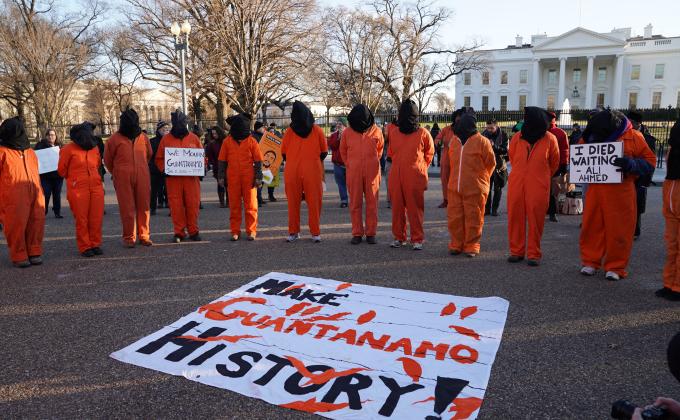Now that the military defeat of the so called “Islamic State” in Iraq and in Syria is nearly complete, the international community and countries involved are faced with new challenges for the post-conflict situation. This includes restoring peace and stability, creating all-inclusive government institutions, resettling displaced communities and adopting reconciliation and rehabilitation efforts. Among these challenges is also the question of how and where to bring terrorists to justice, including members of IS and in particular foreign fighters. A recent deal concluded between local officials and IS reveals that hundreds of IS fighters and their families were smuggled out of Raqqa and spread throughout Syria and beyond. Many of those who have not been killed during battle might flee to small pockets still controlled by IS. Some may join other terrorist organisations or another conflict, whereas others still may travel to their home or third countries.
Regardless of where they are now, there is not just a moral obligation but also a legal obligation to bring terrorists to justice. An integral part of the international community’s efforts to counter terrorism is to hold the perpetrators of terrorist acts accountable for their actions, in accordance with the rule of law and human rights. The principle aut dedere aut judicare is one of the key elements in the fight against impunity and requires i.e. states to criminalize relevant offences and to establish jurisdiction in their national laws. But how can this be achieved in a post-conflict political landscape?
This trilogy of Op-Eds will discuss the different options for prosecuting crimes that amount to terrorism in Syria and Iraq. This includes crimes committed by domestic and foreign members of other terrorist organisations including IS. Members of the Syrian/Iraqi government and armed opposition forces are also alleged to have committed crimes such as extrajudicial killings, torture and kidnapping. The fact that certain terrorist acts have been committed does not mean that these acts cannot be classified as war crimes, crimes against humanity, or genocide. This first Op-Ed looks primarily at the possibilities of prosecuting terrorist crimes within the territory of the so-called caliphate in Syria and Iraq.
Prosecution by national courts
If there is a legitimate and well-functioning government in the aftermath of a conflict, the most obvious option is for national courts to investigate and prosecute the crimes that have been committed based on the principle of territoriality. It is ‘easier’ for national investigators and prosecutors to collect evidence and have access to the accused if the crimes have been committed on their territory. However, the sheer number and gravity of crimes committed in Iraq and Syria would be a challenge for any well-resourced and fully functioning judiciary, let alone within the post-conflict landscape of Syria and Iraq.
Iraq
In Iraq, challenges exist after years of corruption, conflict, ethnic fragmentation and political polarisation. One of the most pressing issues is how the Iraqi military, and to some extent the Kurdish Pershmerga and Shia militia, will take control over territory previously held by IS. Nevertheless, the government, under Prime Minister Haider al-Abadi, is more stable than its Syrian counterpart and the judiciary has some perceived legitimacy. In theory, Iraqi courts could and should prosecute the full spectrum of crimes, whether committed by domestic IS fighters, foreign fighters, Iraqi military forces or any other armed group.
In 2015 a UN report indicated that IS committed crimes against humanity and genocide against Yezidi minorities. This includes crimes such as mass killings, enslavement, torture, sexual slavery, and forcible transfer of population. Iraq has not criminalized international crimes in their national laws, therefore Iraqi courts cannot try international crimes that have been committed in connection with the on-going conflict. However, Iraq has ratified various conventions, such as the Convention against Torture and the Genocide Convention is therefore under the obligation to establish necessary jurisdiction to prosecute these crimes committed on their territory. Additionally, under customary international law, Iraq has the legal obligation to prosecute or extradite war crimes that have been conducted on their territory. There appears to be no sound conventional basis that obliges states to prosecute or extradite crimes against humanity. The fact that Iraq has not criminalized international crimes within the domestic jurisdiction and that courts are ‘unable’ to prosecute some of the perpetrators for the underlying serious crimes they have committed remains an obstacle to fighting impunity and does not do justice to victims.
With the lack of practical options for adjudicating international crimes in Iraq, most prosecutions in Iraq currently occur under the Anti-Terrorism Law no. 13 of 2005. This law has a very broad definition of terrorism and considers violent acts to spread fear or compel the state to take or refrain action as an act of terrorism. The Anti-Terrorism Law no. 13 also refers to ‘terrorist motives’ and ‘terrorist goals’ without providing a definition, which leads to ambiguity and potential misuse for political reasons. Furthermore, the Law does not require proof of terrorist intent, but the much lower evidentiary threshold of membership or support of a terrorist organization to result in convictions punishable by heavy sentences. According to article 4 both the perpetrators of terrorist acts and those who have assisted will receive the same punishment. This means that there is no distinction between a taxi driver working for IS or an IS fighter involved in executions; both face – if convicted – the same punishment. As far as the obligation to extradite or prosecute, this only applies to those acts of terrorism that fall under international anti-terrorism conventions.
It is estimated that around 3,000 suspected members or supporters of IS are awaiting prosecution by Iraqi courts; the majority of whom will be prosecuted by a specialised criminal court of first instance in Qaraqosh on terrorism charges. The court hears up to 50 cases a day in brief sessions, mostly male fighters that were picked up as the military defeated IS strongholds in the north. The numbers of those potentially prosecuted under the Terrorism Law is so large that a law in the summer of 2016 offered amnesty to individuals who joined extremist groups and did not commit a serious offence. Prosecution under the terrorism law is not only possible for Iraqi individuals suspected of having committed terrorist crimes but also for foreign fighters: From Europe alone, around 100 foreign fighters are being held by Iraqi courts, most of whom face the death penalty on the basis of the Anti-Terrorism Law no. 13. This figure includes five German women who are being detained in Iraqi prisons while investigations are ongoing, but they most likely face terrorism charges under the Anti-Terrorism Law no. 13. The courts have also prosecuted other foreign fighters; reports emerged that after the fall of Mosul, a Russian foreign terrorist fighter was sentenced on terrorist charges by a criminal court in Baghdad.
In addition to local and foreign IS fighters, the President of Iraq acknowledges that human rights violations have also been committed by the Iraqi armed forces and militia groups backed by the Iraqi government, in particular during the re-taking of Mosul. However, no prosecutions appear to be taking place. Members of the armed forces can also commit terrorist acts. The conflict in Iraq can be qualified as a non-armed conflict, therefore international humanitarian law is applicable. Crimes such as torture, hostage-taking, collective punishment and acts of terrorism are specifically prohibited in the context of a non-international armed conflict. The fact that certain acts can be qualified as war crimes means that under customary international law, the statute of limitations are not applicable and states have an obligation to prosecute war crimes committed on their territory.
Syria
The post IS landscape in Syria is much more complex and the political future of the country more uncertain than in Iraq, due to the prolongation of armed conflict in certain parts of the country. The Independent Commission of Inquiry on the Syrian Republic has reported on several occasions that all parties involved in the conflict have committed crimes that amount to international crimes, including instilling terror amongst civilians. It appears that international crimes are not criminalized in the Syrian Criminal Code of 1953. However, Syria has – like Iraq –ratified various international treaties including the Genocide and Torture Conventions, and has the obligation to prosecute or extradite genocide and torture that have been committed on their territory.
In areas controlled by the government, the judicial system has become a patchwork of ‘ordinary’ and ‘special’ courts that have jurisdiction. President Bashar al-Assad issued Counter Terrorism Law no. 19 in 2012 and established a Counter-Terrorism Court in Damascus, which has jurisdiction to try terrorist acts and crimes referred to by the Counter-Terrorism Attorney General (AG). These are mainly crimes related to the conflict, including opponents of the Assad regime. The Counter-Terrorism AG has jurisdiction over civilians and military personnel. According to article 9 of the Terrorism Law the aforementioned crimes fall under the Penal Code, and this would imply that the Counter-Terrorism Court can prosecute foreign fighters on the basis of territorial jurisdiction. However, no reliable information has been found as to whether foreign terrorist fighters are actually successfully prosecuted. Military field courts, which are also part of the Syrian judicial system, are tasked to prosecute members of the military for crimes committed during armed conflict under the military penal code; however, thousands of civilians have been prosecuted in mass trials and held at military prisons. Both the criminal proceedings before the Counter-Terrorism Court and military field courts have been heavily criticised.
The political scene in Syria is further complicated by the existence of ‘local’ courts and ‘quasi-judicial’ tribunals in areas controlled by armed opposition groups. One of them is the Syrian Democratic Forces (SDF) which are militarily led by the People’ Protection Units (YPG) consisting predominantly of Kurdish and Arab forces in Northern Syria. On 17 March 2016 the Democratic Union Party (PYD), the political arm of YPG, declared the establishment of the Democratic Federation of Northern Syria (DFNS), also referred to as Rojava. In the areas controlled by DFNS People’s Courts are being set up to handle both civil and criminal cases. Although very little information is available on how these courts operate, who is being prosecuted, and which law is being applied, these courts are – despite the lack of resources, qualified prosecutors and judges – attempting to function during an armed conflict in an area where the government does not have any control. According to Human Rights Watch the People’s Protection Court in Qamishli and Afrin is prosecuting terrorism related crimes. They allege that more than 700 terrorism cases were dealt with by applying a counter-terrorism law adopted by the local legislative council of Rojava in 2014.
To conclude, in both Syria and Iraq the courts could, on the basis of territorial jurisdiction, prosecute all crimes including terrorism that were committed within the two countries. This applies regardless of whether the crimes were perpetrated by foreign terrorist fighters, by fighters of IS or other terrorist organisations, or by armed opposition groups or members of the armed forces in Syria and Iraq. Both countries have utilised their counter-terrorism legislation to prosecute mainly their own nationals, but also to some extent foreign fighters for membership or support of IS. Prosecution of crimes committed by armed forces or affiliated militias have rarely occurred. After years of civil war, courts are underfunded, under-staffed and specialised knowledge and training is lacking with regards to collecting evidence in (post-)conflict situations. Additionally, problems with terrorism legislation exist and courts do not often meet fair trial standards, whereas some of the more specialised courts are highly politicised. Strengthening the capacity and legitimacy of the judiciaries in these countries is therefore a top priority in order to bring justice in the long term. It is important that justice is not only achieved but also conveyed in such a way that can be accepted by the local population. This is the only way people can build trust in the judicial system and contribute to reconciliation efforts.








